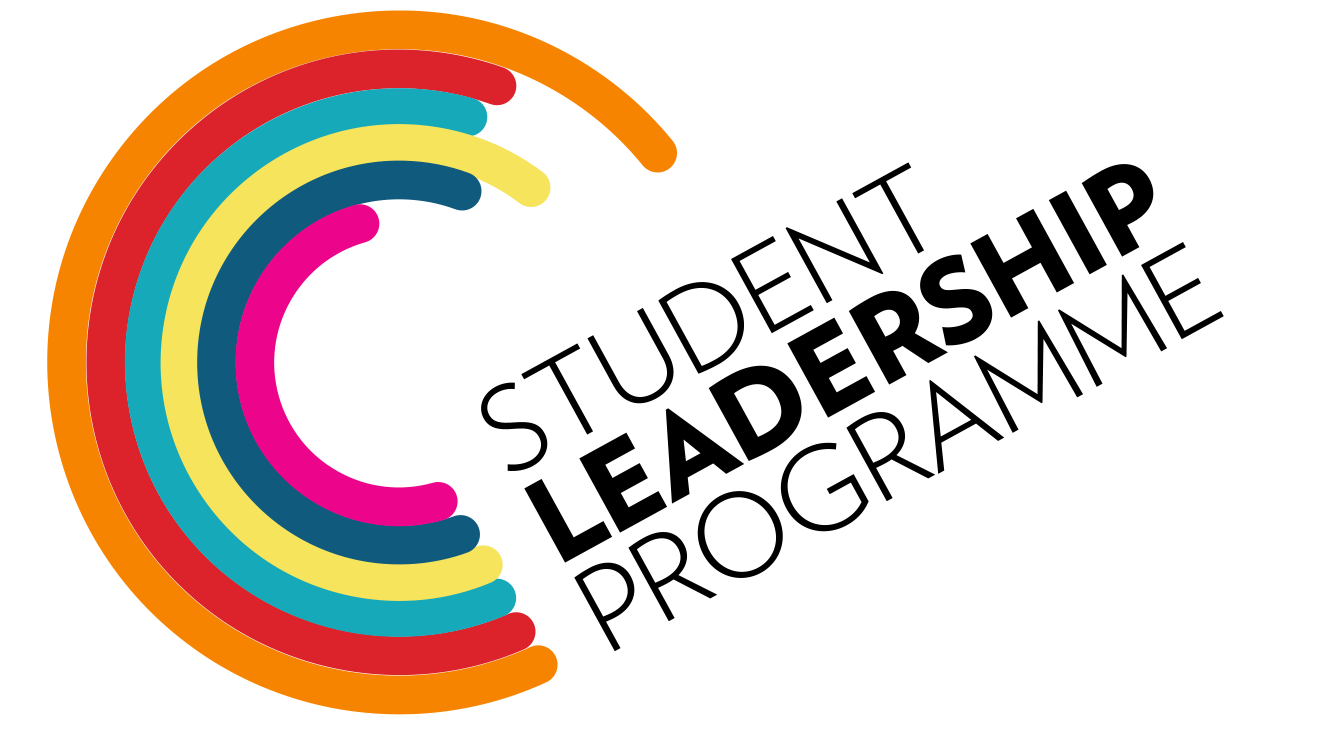Blog from Carmen Neagu
On Saturday 30 June 2018 I attended the ‘Perioperative Leadership; Developing Leaders, Improving Care’ study day, organised by the Association for Perioperative Practice (AfPP), held at Birmingham Women’s and Children’s NHS trust.
The day was opened by Dezita Taylor (@DezitaODP9), who is AfPP West Midlands Regional Lead, registered Operating Department Practitioner (ODP) and Senior Lecturer at Birmingham City University. Her session made us look inwards at what motivates us and what is important for each of us, through a variety of reflective and group activities. We were asked to pick the leadership quote that most resonated with us. Mine was the following, because I don’t think you can expect others to respect you as a leader if you are not prepared to work alongside them for a common goal.
Dezita also provided us with a list of values, and challenged us to pick out 5 that most resonate with us. After selecting way too many, I narrowed down my 5 leadership values to:
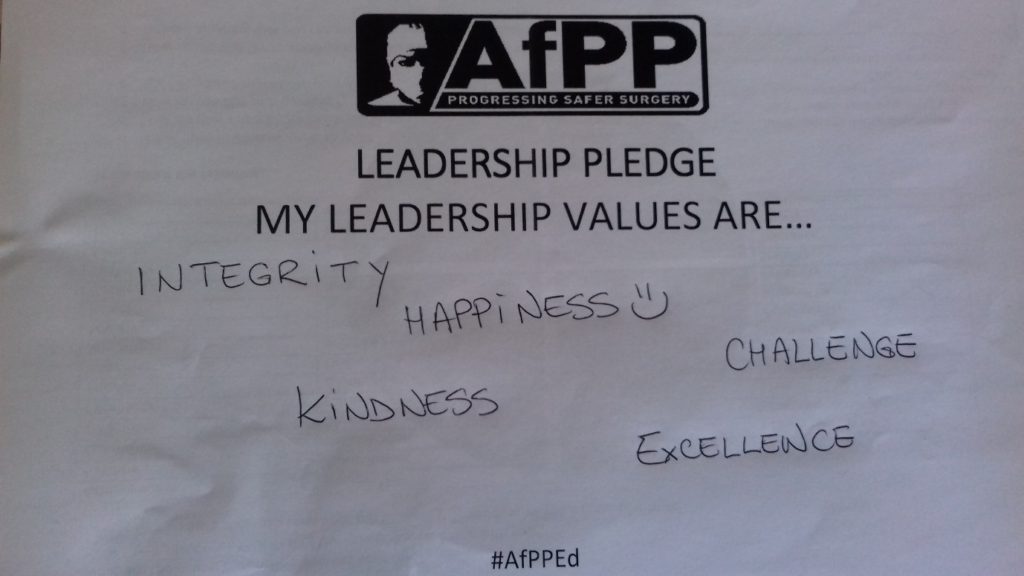
Integrity, because I think it encompasses being honest, taking responsibility for your actions and staying true to your values. Happiness, because life is too short to be unhappy, so live happily, work happily, play happily and lead happily. Kindness is not only fundamental for a career as a healthcare professional, but also vital for building meaningful relationships and gaining people’s respect. In a world where you can be anything, be kind! Challenge, beause I do like a good challenge. It tests and builds my curiosity, creativity, hard-work and adaptability. Last, but not least, excellence, because, for better or worse, I always strive to be the best I can be and do the best work I can do, whether academically or in clinical practice.
Another quote by Dezita which struck a chord within me was: “Take responsibility for the energy you bring into the room”. It made me reflect on how powerful our attitude is and how it can impact (positively or negatively) everyone around you, and how it can ultimately affect patient care. Thus, I pledge to bring positive energy in the rooms I enter.
The next speaker was Dawn Stott (@AfPPCEO), the CEO of AfPP. She took us through a brief history of leadership, and discussed why some of the leadership styles are no longer applicable to the world that we currently live in. In addition, she introduced to us the four colour leadership personality types: red, yellow, green and blue. The picture below depicts the traits of each them, both on a good day and on a bad day. What I found interesting was that although the majority of delegates could identify with a colour quite easily, I struggled to pick one, as I seem to have characteristics from all types, both on good days and bad days. Would that make me a white?
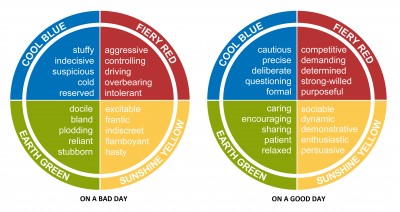
Dawn discussed the 4 colour personality types first from a self-awareness point of view. Knowing what you can achieve when you have a good day, and knowing how to emphasise your strengths. Also, being aware of your bad day characteristics is equally important, in order to understand and manage the impact your bad day is having on everyone around you. In addition, Dawn considered the different personality types in the context of team work. For an effective team you need all four personality types. You also need to understand that others are not necessarily like you, and that what’s obvious to you might not necessarily be obvious to them, because they see things through a different lens to yours. Thus, key for effective teams is understanding, respect and communication.
The third speaker was Alison Wells (@AWatSmartwork), who is a consultant for Smart Work Consulting, as well as a Practice Education Facilitator at The Royal Wolverhampton Trust. Her session focused on emotional intelligence and its importance in clinical practice. Alison also discussed the 4 personality types in regard to emotional intelligence, which flowed nicely from Dawn’s session.
Alison also discussed team cohesion and attributes of successful teams. In doing so, she introduced us to the accountability ladder and to Maslow’s hierarchy of needs applied to employee engagement (both pictured below). Effective teams are highly accountable, recognising that a challenge exists, thinking up ideas to solve it and putting the ideas in practice. Similarly, highly engaged teams are composed of individuals who love their job, understand how their role has a positive impact in the team’s work and are highly motivated. She then challenged us to honestly reflect on where our teams are placed in both scales.
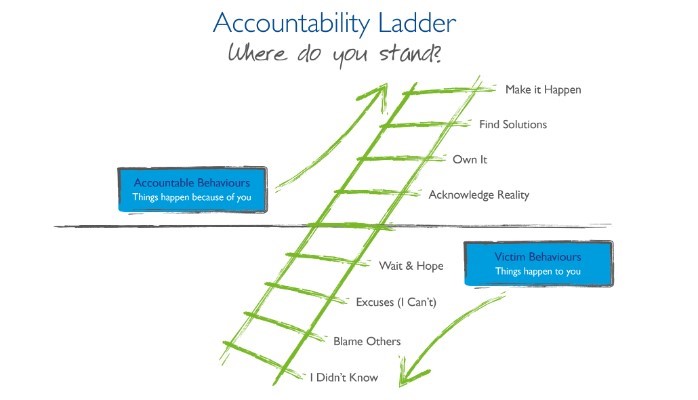
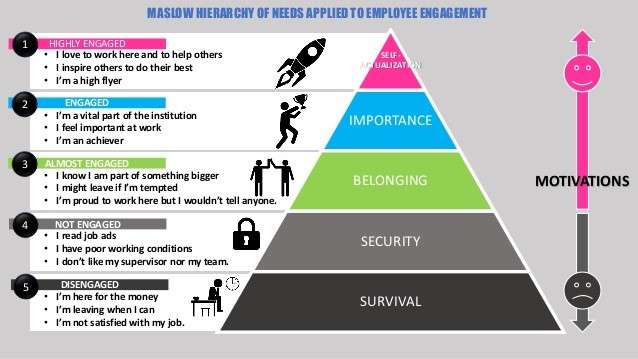
As research has found that employees working in cohesive teams are happier and less affected by stress, if we found that our teams were towards the lower end of the scales, it would be a good idea to take action to improve team working.
Alison then touched on how to implement change, by exploring the Eagles, Sheep and Mules analogy. Eagles are the individuals who embrace change, who have the vision and the plan and who are not afraid of risks. The Sheep are not worried either way, they can see the benefit of change, but also think the current way works. The Mules on the other hand are resistant to change, and think all change is detrimental. They are often very vocal in expressing their opinions. Generally, in organisations there are not many Eagles or many Mules, majority of individuals are Sheep, and the key to implementing change is to not let the Sheep be drawn towards the Mules, but inspiring them and getting them on the Eagle’s side.
On a similar note, after lunch, Helen Bevan (@helenbevan), who is the Chief Transformation Officer for NHS England, discussed how to implement change, regardless of your position in an organisation, emphasising that you do not have to be a manager to implement change. She first set the scene by highlighting some of the unpredictable changes that have happened in recent years, such as Brexit or the Human Genome Project and which can potentially have a huge impact on the future. In doing so, she then emphasised that in the current world the same historical hierarchical structures and styles of leadership are not going to be very successful or well received. Helen then introduced us to Jeremy Heimens and Henry Timms’ New Power and contrasted it with the Old Power as per the image below. The concepts behind the new power is that it is peer-driven, transparent, based on strong interpersonal relationships and focused on creative gain, as opposed to the old power who is profit-driven and held by few individuals, who are setting targets without being aware what happens below them. For more (and better) information on New Power, check out Heimens and Timms Harvard Business Review article: https://hbr.org/2014/12/understanding-new-power
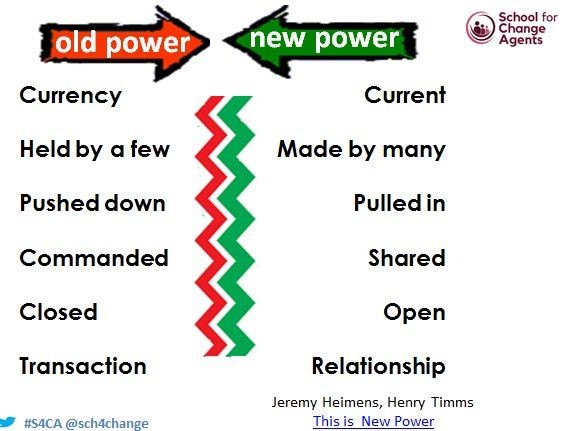
In a new power fashion, Helen discussed how research has shown that only 3% of people in an organisation have the power to influence 85% of the workforce. She also emphasised that these 3% are not always necessarily in leadership positions, but they are the individuals with the most and strongest social connections within the organisation. Thus, Helen’s advice for implementing change was “Find your 3%, get them on your side and then the ideas will reach everyone else”.
Helen also advised that in order to make change, you have to ACE it. Make sure your idea is Actionable, Connected and Extensible, meaning that it is easy to implement, it promotes a close connection with others, making them feel like they are part of a community, and anyone can take the idea and personalise it. Helen then spoke about a good example of an ACE idea: the #TheatreCapChallenge, which is an initiative to improve patient safety in theatres by ensuring that everyone knows everyone’s name and role. It was started by Rob Hackett, an anaesthetist in Australia, and it has now spread across the world. For further information on the #TheatreCapChallenge, you can follow this link: https://www.psnetwork.org/theatrecapchallenge-wheres-the-evidence/
Last, but not least, Kat Topley, Clinical Efficiency Manager at 3M, got us to focus on our own goals and opportunities. In preparation for her session, she asked us to conduct a SWOT analysis (Strengths, Weaknesses, Opportunities and Threats) of ourselves. Her session reinforced much of the learning throughout the day, whilst bringing the focus on our own clinical practice environments and the actions we can take forward from the day.
Kat also showed us the following video, which I found to be a very powerful way of portraying how important courage is in leadership. Additionally, it highlights the importance of the first follower, as well as the recognition the follower deserves. The learning I took from the video is that in order to be a leader, you need a vision, you need the courage to stand alone, and you need to appreciate your first follower and make them an equal in a shared vision.
https://www.youtube.com/watch?v=fW8amMCVAJQ
To wrap it up, it was a very enjoyable day, full of learning and left me with lots to reflect on. I shall leave you with Simon Sinek who is discussing love, relationships and leadership. It is a slightly lengthy video, but very much worth the time: https://www.youtube.com/watch?v=dsQPhVwXcuc&feature=share
